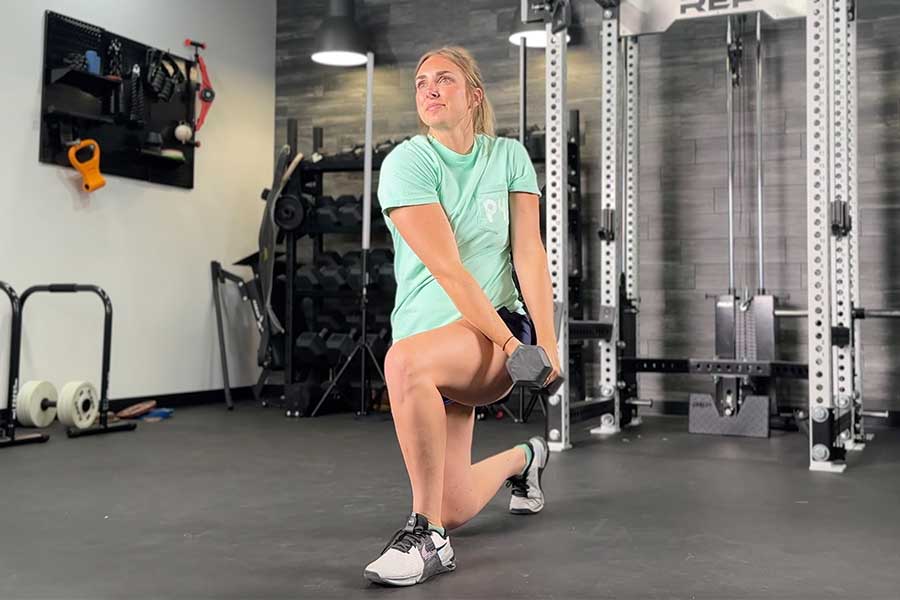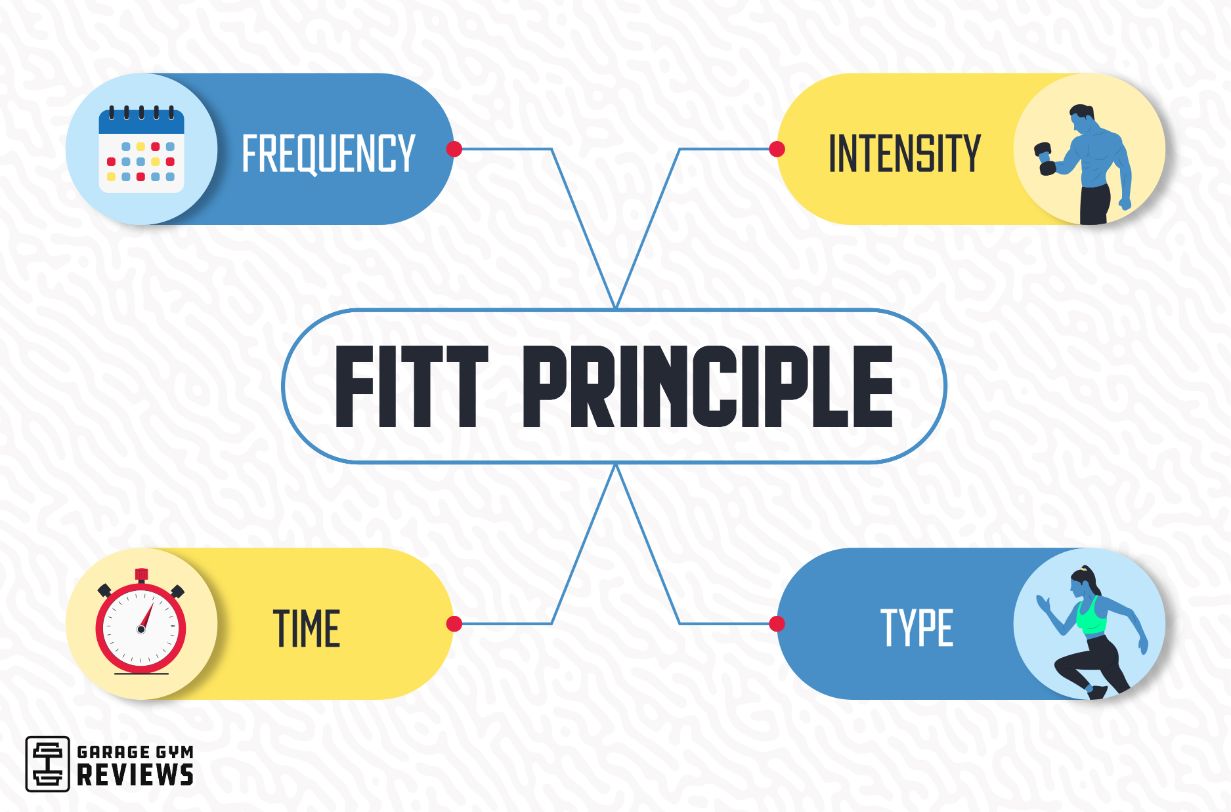One of the most popular workout splits for muscle gain is push-pull-legs. On push day, you hit the chest, shoulders, and triceps. Pull day involves activating the back and biceps. Leg day means working the lower body to the extent you can’t walk for the rest of the week. Well, hopefully not.
I love this training split, but there are downsides. After your chest and shoulder workout, you have little left in the tank to do a tricep workout. Pull-ups obliterate your biceps, so training this body part with heavy weights is difficult. Lifting lighter weights is better than nothing, but sometimes, I want to do heavy biceps curls and other arm exercises.
RELATED: Chest, Shoulders, Triceps Workouts
One solution? Shoulder and biceps workouts. Because both muscle groups don’t impact the other, you can lift heavy on both in the same workout. In this article, I’ll go through three workout routines for the shoulders and biceps, the anatomy of both muscle groups, and the benefits of exercising this way. In the end, you can decide for yourself if you want to give it a try.
The Best Shoulder and Biceps Workout Routines
Let’s get straight to it. Here are three shoulder and biceps workouts for three different fitness levels that I—a certified personal trainer (CPT)—would recommend to a client:
Beginner
Our beginner shoulder and biceps workout routine has four exercises—two for the shoulders and two for the biceps.The rep range is high, so you can keep your weight low at first and work your way up for progressive overload.
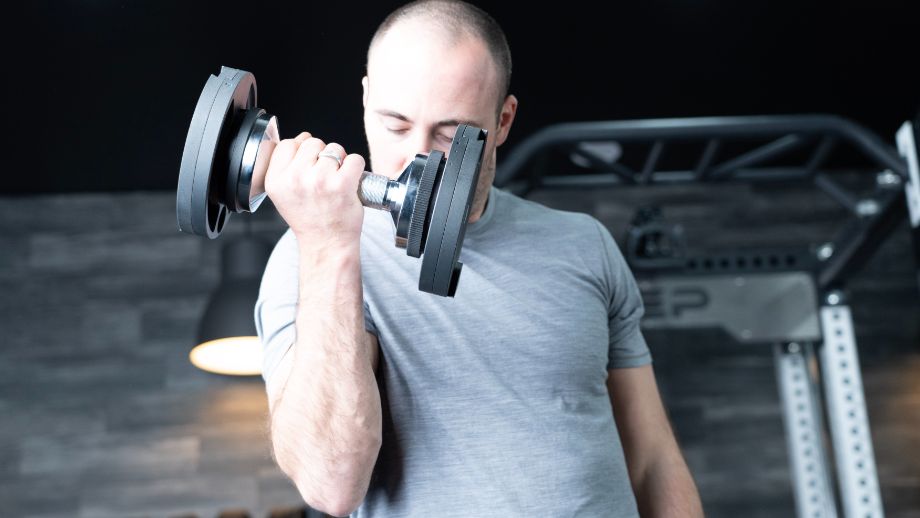
See below:
| Exercise | Sets | Reps |
| Machine Shoulder Press | 3 | 8 |
| Standing Dumbbell Curl | 3 | 8 |
| Dumbbell Lateral Raise | 3 | 10 |
| Cable Reverse Curl | 3 | 12 |
Expert notes:
Do the standing dumbbell curls with both arms or alternate for repetitions. To do cable reverse curls properly, set the pulley to its lowest position, attach a straight bar, and take hold of it with an overhand grip (palms facing the floor). Keep your elbows pinned to your sides and your shoulder blades retracted, then curl the bar toward your shoulders.
Intermediate
If my beginner shoulder and biceps workout becomes too easy, you’re ready to step it up a notch. You’ll use a barbell, a pair of dumbbells, and a cable machine to complete this intermediate bodybuilding workout:
| Exercise | Sets | Reps |
| Dumbbell Shoulder Press (or Arnold Press) | 3 | 6 |
| Barbell Curl | 3 | 8 |
| Barbell Upright Row | 3 | 10 |
| Single-Arm Cable Curl | 3 | 10 |
| Cable Lateral Raise | 3 | 12 |
Expert notes:
I prefer regular ol’ dumbbell shoulder presses to Arnold presses because they allow me to lift heavier weights, but try both strength training exercises to see what works for you.
With upright rows, stand with your feet shoulder-width apart and a barbell in front of your body. Pull the bar to shoulder height, squeeze your delts and traps, and return the barbell to the starting position.
Advanced
With this advanced shoulder and biceps workout, you’ll add a bodyweight biceps exercise and a barbell shoulder exercise. You’ll also be doing more sets to increase your intensity:
| Exercise | Sets | Reps |
| Chin-Up | 4 | 6 |
| Barbell Overhead Press | 4 | 8 |
| Dumbbell Hammer Curl | 3 | 8 |
| Dumbbell Lateral Raise | 3 | 10 |
| Machine Rear Delt Fly | 3 | 12 |
| Cable Biceps Curl (Straight-Bar or Rope attachment) | 3 | AMRAP* |
*As many reps as possible.
Expert notes:
You’ll need a longer rest period after the first two exercises—around two to three minutes—but only a minute or so for the following four exercises. If you’re limited on time or want to increase the intensity further, superset the third and fourth exercises and the fifth and sixth. If your gym doesn’t have a rear-delt fly machine, try any of our best rear-delt exercises instead.
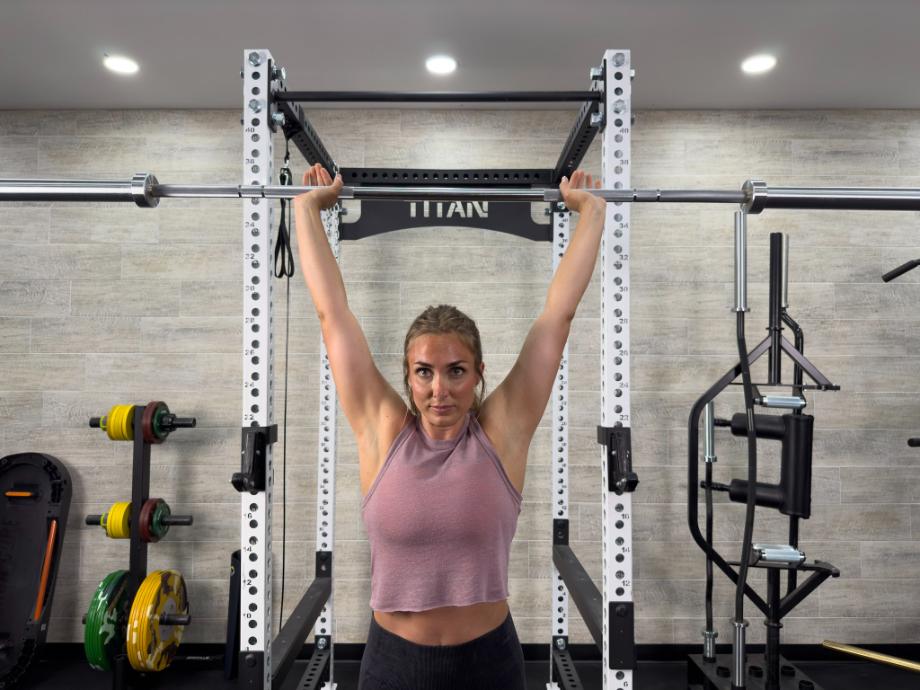
Before I move on, there’s something I need to address. You may have noticed front raises aren’t in any of the workouts above; this is intentional. I assume you’ll work your chest on a separate day, and the anterior deltoid gets hit during chest exercises, especially when an incline is involved.
A 2010 randomized controlled trial by the Journal of Strength and Conditioning Research1 concurred. It found that 28, 44, and 56-degree inclines are better than a 0-degree incline to activate the anterior deltoid during chest exercises.
Shoulder and Biceps Workout Expert Training Tips
Below are a few of my expert tips to make the most out of your shoulder and biceps workouts:
Warm Up First
If you’re new to training or eager to start, you probably don’t think you need to warm up. Wrong. Benefits of the best warm-up exercises include improved flexibility, looser muscles and joints, and increased performance. Arm circles, arm swings, push-ups, and resistance band pull-aparts are some of the best exercises to prepare for a shoulder and bicep day.
Use the Full Range of Motion
Make the most out of each exercise by using the full range of motion. Two exercises that I often see done with a partial range of motion are barbell curls and chin-ups. With the former, you want to start with extended arms and get as close to your shoulders as possible.
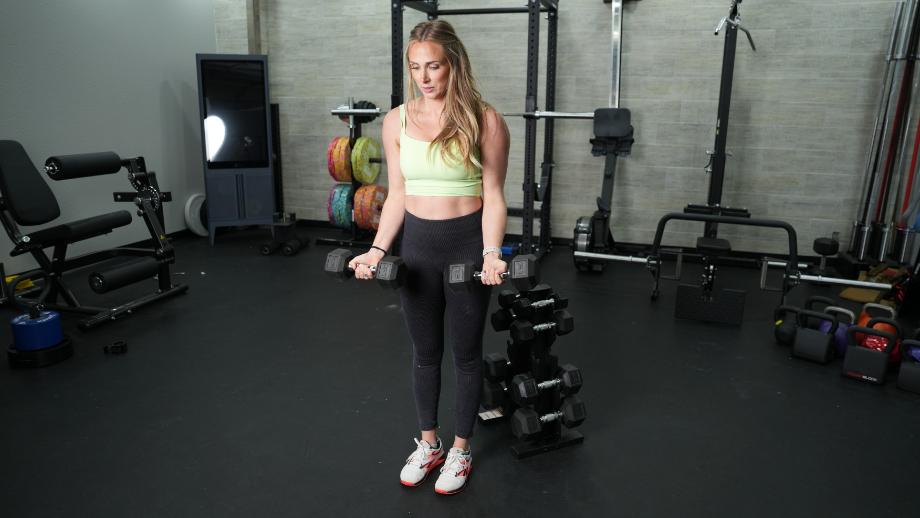
During chin-ups, start in a dead hang position and aim to clear the bar with your chin. If you neglect this, you could be losing out on potential gains.
Try Different Variations
Some people prefer doing chin-ups with an underhand grip, whereas others prefer a neutral grip. Do your upright rows with a barbell, dumbbells, or a cable machine. You can also do a full dumbbell workout or mix it up with machines. You can do dumbbell curls standing or seated on an incline bench. I’ve given some alternatives, but with this upper-body workout, don’t be afraid to experiment with your workout routine.
Change the Order
Although I based the above workout routines on my years of experience training, you can adjust the order of the exercises if necessary. If your shoulders are weaker than your biceps, do all the shoulder exercises first. The same goes if you feel your biceps are lacking. The first 20 to 30 minutes of any workout is when you have the most energy—so use it wisely.
Why Work Shoulders and Biceps Together?
If you’ve gotten this far but are still wondering, “Why should I combine shoulder exercises with bicep exercises?” Here are three reasons why this arm workout routine makes sense:
Neither Muscle Will Fatigue
One benefit of a shoulder and biceps workout over a push-pull-legs routine is that neither your shoulders nor biceps get fatigued once you get to them. After three or four back exercises, doing heavy biceps exercises is nearly impossible. The same applies to your shoulders after two or three chest exercises. Training this way means you’ll be able to hit both muscle groups fresh, which could lead to additional muscle growth.
They Don’t Interfere with Each Other
You don’t use your biceps much when you work your shoulder muscles because activating the biceps doesn’t require them. Although it’s common to work complementary muscle groups together—for example, your chest and triceps, if you think about it, working opposing muscle groups makes a lot of sense because they don’t interfere with each other in any way.
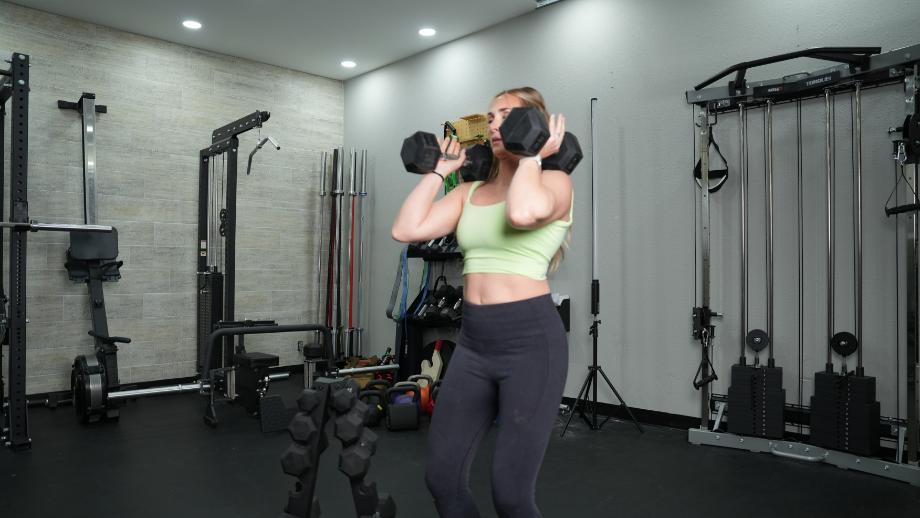
Adds Variety to Your Training
Variety is the spice of life. I try to change up my workout routine to keep things interesting, and incorporating a shoulder and biceps workout is one way to accomplish this. It’ll mean you’ll have to change your other workouts to ensure you hit every major muscle group at least once per week, but doing so could make a significant difference.
Shoulder and Biceps Anatomy
Last but not least, let’s briefly discuss the anatomy of your shoulders and biceps.
Shoulders
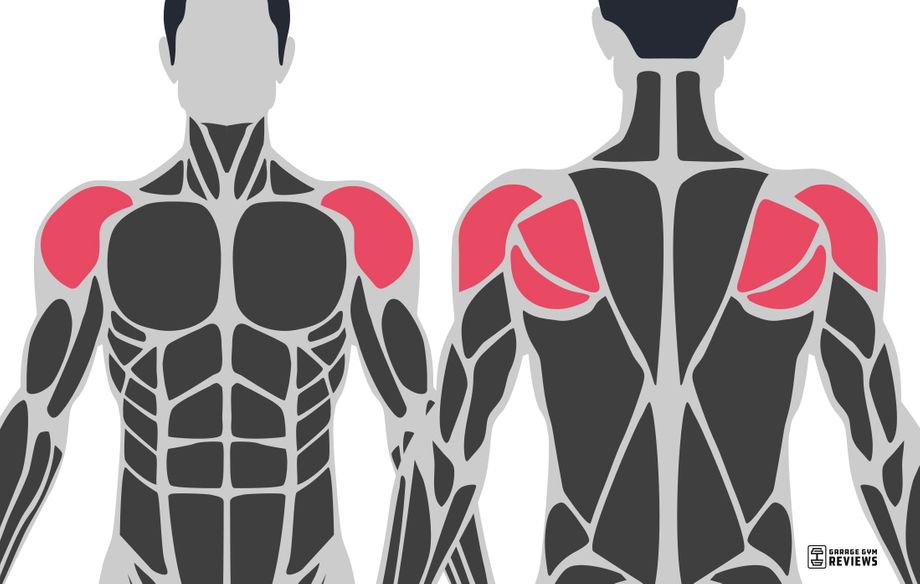
Several muscles form the shoulder muscle group, including:
- Rotator cuffs
- Teres minor
- Rhomboid minor
- Trapezius
- Deltoid
The shoulder muscles have many functions, including abduction, adduction, flexion, extension, and internal and external rotation2. They also play a critical role in providing stability to the shoulder joint, a ball and socket joint with the most extensive range of motion in the human body.
Biceps
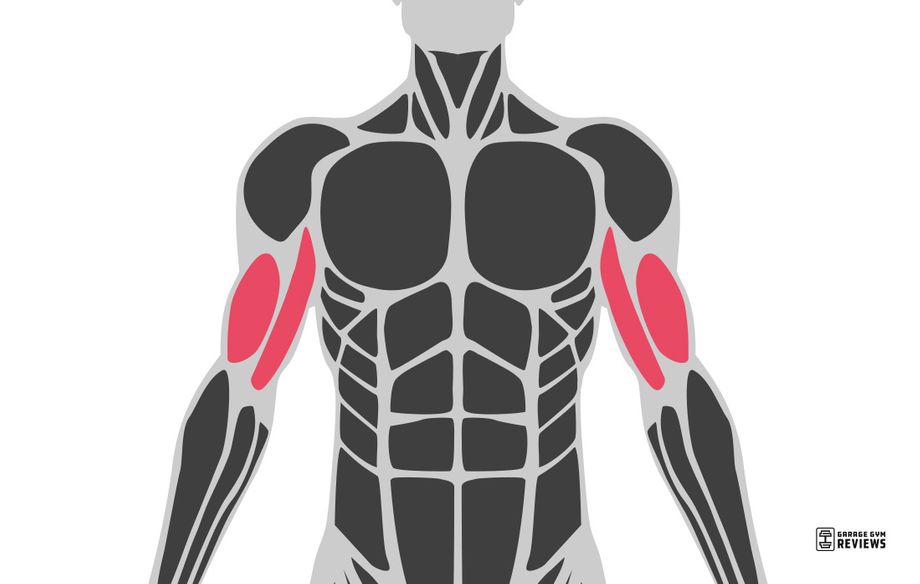
The biceps muscle (also known as the biceps brachii) is a large, thick, fusiform muscle on the upper arm’s ventral portion3. It consists of two heads—the short head (medial side) and the long head (lateral side).
Forearm supination—when you turn your palms upward—uses the biceps. The biceps are also responsible for flexing the elbow (brachialis) and work with the triceps to stabilize the shoulder joints during overhead movements such as dumbbell shoulder presses.
Shoulder and Biceps Workout: Final Thoughts
If you’re used to doing a push-pull-legs or full-body training split, you’ve probably found that the shoulders and biceps don’t get the attention they deserve. Incorporating a shoulder and biceps workout means neither muscle group gets fatigued, which is especially important if one—or both—of these muscles are lacking.
Here’s my advice as a CPT:
- Give it a go. It might work for you, or you might hate it. Either way, you won’t know until you try. Even if the sound of a shoulder and biceps workout makes you cringe, don’t knock it before you’ve given it a go.
- Plan the rest of the week. The downside of a shoulder and biceps workout is that it’ll be difficult to train your chest or back the following day. Working your legs the next workout makes the most sense. Plan the week so you know what you’re doing.
- Superset exercises if needed. For those limited on time, don’t feel like you have to skip exercises with the above workouts. Instead, utilize supersets to save time and still make progress.
Shoulder and Biceps Workout: FAQs
Can I do shoulders and biceps together?
Yes, you can do shoulders and biceps together. It’s not as popular as other muscle group combinations, but I (a certified personal trainer) sometimes do shoulder and biceps workouts and enjoy them. When you work the biceps after back exercises or the shoulders after chest exercises, they’ll be fatigued, so you won’t be able to give them everything. This way, both muscle groups will be fresh, and the benefit is that neither interferes with the other.
Should you work shoulders or biceps first?
If you feel your shoulders lack strength and size, you should work your shoulder muscles first. For weaker biceps, hit your biceps first. If you believe that both muscle groups need equal attention, it should come down to the difficulty of the exercise. Compound exercises such as chin-ups and overhead presses should come before isolation exercises such as cable bicep curls and dumbbell lateral raises.
What exercise works biceps and shoulders?
Although there aren’t any exercises that effectively work both the biceps and shoulders at the same time, examples of exercises that work one of the two muscle groups include:
– Dumbbell shoulder press
– Arnold press
– Barbell overhead press
– Barbell curl
– Standing dumbbell curl
– Dumbbell lateral raise
– Barbell upright row
– Chin-up
– Dumbbell hammer curl
– Rear-delt fly
Everybody will have different preferences for the exercises they enjoy and what works for them. Try out the above exercises and see what works for you.
References
- Trebs AA, Brandenburg JP, Pitney WA. An electromyography analysis of 3 muscles surrounding the shoulder joint during the performance of a chest press exercise at several angles. J Strength Cond Res. 2010 Jul;24(7):1925-30. doi: 10.1519/JSC.0b013e3181ddfae7. PMID: 20512064.
- McCausland C, Sawyer E, Eovaldi BJ, et al. Anatomy, Shoulder and Upper Limb, Shoulder Muscles. [Updated 2023 Aug 8]. In: StatPearls [Internet]. Treasure Island (FL): StatPearls Publishing; 2024 Jan-. Available from: https://www.ncbi.nlm.nih.gov/books/NBK534836/
- Tiwana MS, Charlick M, Varacallo M. Anatomy, Shoulder and Upper Limb, Biceps Muscle. [Updated 2024 Jan 30]. In: StatPearls [Internet]. Treasure Island (FL): StatPearls Publishing; 2024 Jan-. Available from: https://www.ncbi.nlm.nih.gov/books/NBK519538/





